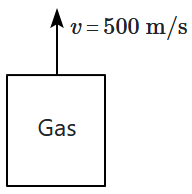Explanation: Analyse the motion of a vessel containing an ideal gas affects the pressure inside it, as observed from the ground. Let’s explore the key principles to understand the effect of the rocket's motion.
The pressure of an ideal gas is related to the root mean square (RMS) velocity of the gas molecules by:
\(P = \frac{1}{3}nmv_{\text{rms}}^2\)
Effect of the rocket’s motion: The rocket is moving vertically at
\(500~\text{m/s}.\) The pressure inside the gas vessel depends only on the relative motion of the gas molecules with respect to the vessel walls. Since the gas molecules are already moving randomly inside the vessel, the motion of the vessel as a whole does not change the relative velocity of the gas molecules with respect to the walls.
From our perspective on the ground, the entire system (vessel + gas) moves upward at
\(500~\text{m/s}.\) However, since pressure depends only on the relative motion of gas molecules and the vessel walls, the uniform vertical motion of the vessel does not affect the gas molecules’ random motion inside the vessel.
Effect on RMS velocity \(v_{\text{rms}}\): The original mean square velocity of the gas molecules remains unchanged because the vertical motion of the vessel does not impact the random motion of individual gas molecules. Hence, the pressure remains unchanged as well.

As the motion of the vessel as a whole does not affect the relative motion of the gas molecules with respect to the walls of the vessel, hence pressure of the gas inside the vessel, as observed by us, on the ground remains the same.
Hence, option (2) is the correct answer.
